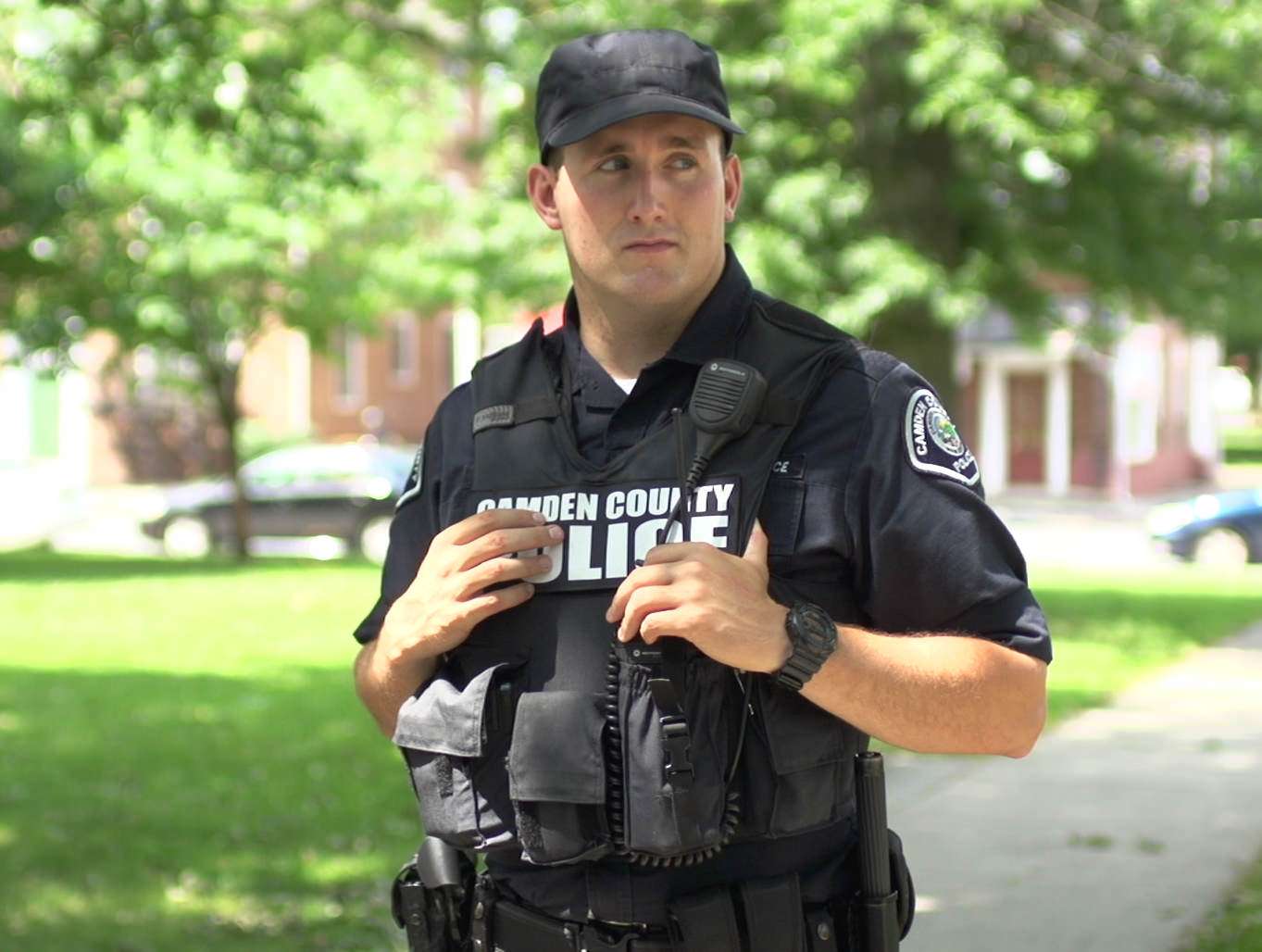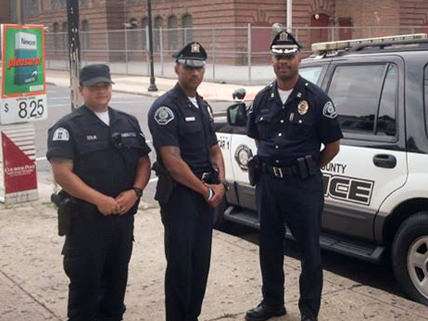How Cops Are Beating Crime in America's Poorest City
Is Camden, New Jersey, a "surveillance city" or a triumph of 21st century policing?
It's been called "surveillance city," "a police state," and "a proving ground for futuristic crowd-control technology."
Camden, New Jersey., considered the poorest and most dangerous city in America, is getting a reputation for being the epicenter of Big Brother-style law enforcement. A VICE story that aired recently on HBO and a piece in Rolling Stone by Matt Taibbi—which depicted Camden as an apocalyptic "dopescape of barred row homes and deserted factories"—drove home this point.
The city's streets are monitored by 121 cameras and 35 microphones, which feed data to a new $4.5 million Real Time Tactical Operations Intelligence Center. The police department runs a mobile "Sky Patrol," which is a platform that extends 40 feet into the air, providing a bird's eye view of the city for a bevy of camera feeds.
Camden's tilt towards surveillance is somewhat disconcerting, but overall the stories told by VICE and Taibbi—who wrongly declared that there's "no hope" in Camden—miss what's laudable about the city's new approach to policing. A year and a half ago, Camden was liberated from an outrageous police union contract that let cops get away with working bankers hours and desk jobs—when they bothered to show up for work in the first place. Now, thanks to the dissolution of the union contract and other reforms, Camden cops are actually doing the job of policing this crime-ridden town. And they're making headway.
Breaking the Union
Camden's old city-run police force abused its power and abrogated its duties. It took Camden cops one hour on average to respond to 911 calls, or more than six times the national average. They didn't show up for work 30 percent of the time, and an inordinate number of Camden police were working desk jobs. A union contract required the city to entice officers with extra pay to get them to accept crime-fighting shifts outside regular business hours. Last year, the city paid $3.5 million in damages to 88 citizens who saw their convictions overturned because of planted evidence, fabricated reports, and other forms of police misconduct.
In 2012, the murder rate in Camden was about five times that of neighboring Philadelphia—and about 18 times the murder rate in New York City.
Then in 2013 the city dissolved the 141-year-old department and replaced it with a new county-run force (known as "Metro") that was redesigned from the ground up—or every "police chief's dream," says Jose Cordero, 58, the highly regarded law enforcement expert and Bronx native who was brought in to configure the new agency. Cordero is best known for overseeing a 70 percent violent crime drop in East Orange (another impoverished Garden State town) when he was the city's police director there from 2004 to 2007, a period in which the city's poverty rate barely shifted.
A year and a half after Camden tapped Cordero, crime is down. So far in 2014, Camden has had half as many homicides as it did in 2012, which was the city-run force's last full year of operation (albeit a record high year for murders).

And residents are buzzing about how the city feels different. "I hear less gun activity, and I feel that it's less likely that I'll be the victim of a violent crime," says Pastor Tim Merrill, 56, a lifelong resident of the city who runs a youth leadership program and is the president of the Concerned Black Clergy of Camden. "It's drastically different in a positive way," says Lorsely Boogaard, 56, who has resided in Camden for 18 years.
When the city disbanded its police force, the union contract was invalidated, which allowed Cordero and Metro Police Chief Scott Thomson to assign many more officers to foot patrol in dangerous neighborhoods.
The old city-run force was rife with cops working desk jobs, which Cordero saw as a waste of money and manpower. He and Thomson hired civilians to replace them and put all uniformed officers on crime fighting duty. Boogaard says she didn't see a single cop during the first year she lived in the city. "Now I see them all the time and they make friendly conversation." Pastor Merrill says the old city-run force gave off a "disgruntled" air, and the morale of Metro police is noticeably better. "I want my police to be happy," he says.
Another coup: In Metro's first year, Cordero and Chief Thomson scored a one-year exemption from state civil service rules, which severely limit the discretion that police chiefs have in hiring and promoting their staff. That made it possible for them to break rank and quickly elevate talented junior officers. On Cordero's initiative, Metro replaced the basic aptitude test for screening new recruits mandated by civil service, which "has nothing to do with law enforcement." The new test was geared toward identifying candidates with interpersonal skills; a sample essay question asked aspiring Camden cops to recount a "difficult situation" in which they "displayed empathy and sensitivity toward others."
Cordero also redesigned the field-training program to stress community-building tactics. "The new officers were taught that when they walk the streets they have to go meet people, introduce themselves, and ask people what they're concerned about," he says.
"As police, we sometimes forget that we operate by the consent of the community," says Cordero, "and our success is determined by the community." This philosophy stems from Cordero's background as a high-ranking commander with the New York City Police Department (NYPD), where he spent time in a division of the Civilian Complaint Review Board, an independent body that investigates instances of alleged police misconduct. Later he was the commanding officer of the NYPD's community advocates office.
His goal was to shift perceptions of crime, not just improve stats. In the mid-1990s, when Cordero served as the head of the 40th Precinct in the South Bronx, he observed that when crime rates fell, community members didn't always feel safer. That's because often their concerns were hyper-local. "The homicide rate is what the nation watches, but residents may be more focused on the drug dealers on the corner that their kids have to walk by," says Cordero. "It's still the zombie apocalypse in downtown Camden on a Saturday," says Pastor Merrill referring to the city's drug addicts, but the narcotics trade has mostly moved indoors.
Surveillance City
Under Cordero's watch, Camden was wired to the gills with cameras and microphones. When a gun is fired in the city, a system of microphones called ShotSpotter can triangulate the signal and pinpoint the location of the shooter within several feet. Using their home computers, a team of citizen volunteers can direct the city's many surveillance cameras to zone in on activity that they deem suspicious.
As VICE reported, Metro captures the license plate numbers of every car entering Camden, and often sends threatening letters to the registered owners on the grounds that these visits could be drug-related.
The use of surveillance equipment "raises very serious civil liberties concerns" and must be "accompanied by robust transparency and accountability measures," says Ari Rosmarin, the public policy director at the American Civil Liberties Union (ACLU) of New Jersey. "It's not clear to the public how long footage is retained, who has access to it, and we don't know what happens when ancillary conversations are picked up on ShotSpotter."
Civil libertarians are right to be concerned about government surveillance, but they should also acknowledge that unlike the paramilitary gear that horrified the nation when it appeared on the streets of Ferguson, Missouri, cameras and microphones actually make communities safer. ShotSpotter raises privacy issues, but it also liberates police from having to rely on citizens to report gunfire and it can bring a squad car to the scene of a shooting in no time. When ShotSpotter detects gunfire, Camden's new Automatic Vehicle Locator System can instantly determine the location of the two nearest patrol cars, which has brought the city's average 911-response time from one hour to 90 seconds.
It's incumbent on local police departments to be more open about how they're using the data they're collecting and to invite independent monitors to oversee their internal procedures. Like wearable cameras for cops, which the ACLU favors, street surveillance can also protect citizens from being abused by the police, which is why Metro should make the footage it collects available to the public upon request.
The bottom line: Turning off the cameras and microphones isn't the solution.
"Citizens are generally more interested in knowing when cameras are coming to their block," says Cordero, which is understandable given the severity of the city's crime problem. "Twenty years ago, I would have been on the civil liberties side, but now I think the [surveillance] is absolutely wonderful," Laura Sánchez told The Philadelphia Inquirer when the cameras first started appearing in the city. Robert Kressley, 44, says these tactics are appropriate if used effectively. "If all the cameras are really upping the rate at which the police are able to apprehend violent offenders, then it's OK," he says. "I'm hearing from a lot of people that this is a deterrent," says Pastor Merrill. "And I want the police to know instantaneously where a shot came from."

But Merrill is skeptical that better policing tactics are the solution to the crime problem. He believes the key is to bring more jobs into the community. "In Camden, I guarantee that poverty and high crime will be kissing cousins until we handle both of them."
Merrill is articulating the still prevalent view that crime is rooted in poverty, which the Manhattan Institute's Heather Mac Donald has called "one of the most destructive social theories that came out of the 1960s," providing the intellectual underpinnings of the Great Society. It also gave urban cops a great excuse to treat their jobs like 20 years of seat warming en route to a fat pension, while waiting for poverty to be eradicated.
Cordero has spent his career demonstrating that safe streets are a prerequisite to economic activity, not the other way around. "In the poorest community, there are a lot of good folks who just can't afford to move elsewhere and the people causing the problems are a minority," he says. "So if you deal with them effectively, you can bring down crime by a staggering amount." Hopefully, he'll be proven right again in Camden.


Show Comments (66)